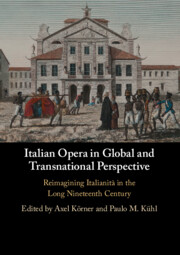 Italian Opera in Global and Transnational Perspective
Italian Opera in Global and Transnational Perspective Book contents
- Italian Opera in Global and Transnational Perspective
- Italian Opera in Global and Transnational Perspective
- Copyright page
- Contents
- Figures
- Tables
- Examples
- Notes on Contributors
- Preface and Acknowledgements
- 1 Opera and Italianità in Transnational and Global Perspective
- 2 Giving Singers a Voice
- 3 Nina d’Aubigny’s ‘Italian Voice’
- 4 Italian Opera and Creole Identities
- 5 Italian Opera in Vormärz Vienna
- 6 Southern Exchanges
- 7 ‘For a Moment, I Felt Like I Was Back in Italy’
- 8 Reimagining Rossini
- 9 From Heaven and Hell to the Grail Hall via Sant’Andrea della Valle
- 10 Arcadia Undone
- 11 Italian Impresarios, American Minstrels and Parsi Theatre
- 12 German National Identity and Operatic Italianità
- 13 (Opera) Fever in Belle Époque Manaus
- 14 Between ‘Sung Theatre’ and Asakusa Opera
- 15 Epilogue
- Index
9 - From Heaven and Hell to the Grail Hall via Sant’Andrea della Valle
Religious Identity and the Internationalisation of Operatic Styles in Liberal Italy
Published online by Cambridge University Press: 17 March 2022
- Italian Opera in Global and Transnational Perspective
- Italian Opera in Global and Transnational Perspective
- Copyright page
- Contents
- Figures
- Tables
- Examples
- Notes on Contributors
- Preface and Acknowledgements
- 1 Opera and Italianità in Transnational and Global Perspective
- 2 Giving Singers a Voice
- 3 Nina d’Aubigny’s ‘Italian Voice’
- 4 Italian Opera and Creole Identities
- 5 Italian Opera in Vormärz Vienna
- 6 Southern Exchanges
- 7 ‘For a Moment, I Felt Like I Was Back in Italy’
- 8 Reimagining Rossini
- 9 From Heaven and Hell to the Grail Hall via Sant’Andrea della Valle
- 10 Arcadia Undone
- 11 Italian Impresarios, American Minstrels and Parsi Theatre
- 12 German National Identity and Operatic Italianità
- 13 (Opera) Fever in Belle Époque Manaus
- 14 Between ‘Sung Theatre’ and Asakusa Opera
- 15 Epilogue
- Index
Summary
The decades between unification and World War I saw opera in Italy absorb multiple literary and musical influences from beyond the Alps, including exoticism and naturalism and, successively, the operas of Meyerbeer and Wagner. For the generation of the giovane scuola this was often characterised as a crisis of national musical style and identity, strongly linked to the post-Risorgimento imperative to create a compelling civic and political culture for the new nation. The religious question, and the battle between the Church and state, posed a further set of questions in developing this national identity, which can be traced through opera's engagement with foreign influences. Examining new Italian operas ranging from Franchetti's Asrael to Puccini's Tosca, this chapter will suggest that librettists and composers approaching religious themes were keenly aware of the need to create a vocabulary of religious images and sounds which the predominantly Catholic audiences across Italy could recognise, even when adopting ideas from French or German literary and musical models. Ultimately, this period was crowned with the arrival of Parsifal on Italian stages, when Catholic readings of Wagner's symbology and echoes of Palestrina promoted a particularly Italian interpretation of the opera’s meaning and musical language.
Keywords
- Type
- Chapter
- Information
- Italian Opera in Global and Transnational PerspectiveReimagining Italianità in the Long Nineteenth Century, pp. 167 - 191Publisher: Cambridge University PressPrint publication year: 2022
